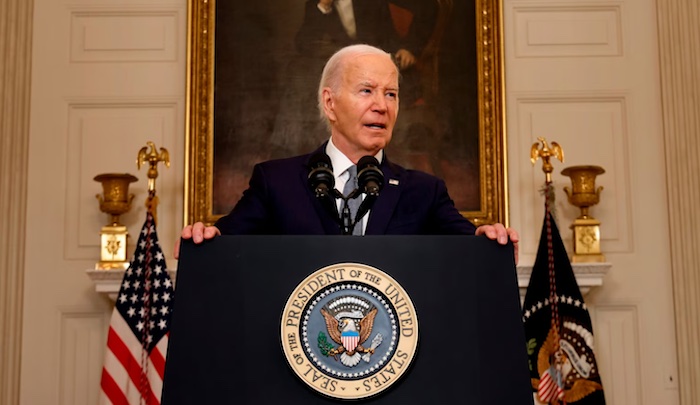Biden pushes for Gaza ceasefire amid Lebanon truce as Hamas resistance continues

President Joe Biden has said the US will make another push with regional powers for a ceasefire in Gaza, involving the release of hostages and the removal of Hamas from power.
His remarks on X come just hours after a ceasefire came into force in Lebanon between Israel and Hezbollah, ending nearly 14 months of conflict.
Hamas said it hoped for a similar deal in Gaza but continues to reject Israel’s demands, which it perceives as surrender.
Israel launched a campaign to destroy Hamas in response to the group’s unprecedented attack on southern Israel on 7 October 2023, in which about 1,200 people were killed and 251 others were taken hostage.
More than 44,000 people have been killed and more than 104,000 injured in Gaza since then, according to the territory’s Hamas-run health ministry.
“Over the coming days, the United States will make another push with Turkey, Egypt, Qatar, Israel, and others to achieve a ceasefire in Gaza with the hostages released and an end to the war without Hamas in power,” Biden said on X.
US national security adviser Jake Sullivan said Biden had agreed with Israeli Prime Minister Benjamin Netanyahu right before the announcement of the Lebanon ceasefire to try again for a Gaza agreement, which negotiators have sought unsuccessfully for months.
The US and its Arab allies used to say that a ceasefire in Gaza would end the conflict with Hezbollah. Now they are hoping for the reverse.
The argument goes that the truce in Lebanon shows compromises are possible and that Hamas may now feel more isolated, putting pressure on it to agree to concessions.
However, the goals of the Israeli government in Lebanon were always more limited than those in Gaza, where it has failed to agree a post-war plan.
Qatar recently suspended its efforts to help mediate a ceasefire and hostage release deal in the Palestinian territory until both sides shifted their positions. Hamas insists on ending the war and a full withdrawal of Israeli forces, while Israel remains determined to destroy Hamas.
Netanyahu’s political survival is also bound up with Gaza. His far-right coalition partners aspire to rebuild Jewish settlements there and have threatened to collapse the government if Israel makes a “reckless” agreement to stop the fighting.
Netanyahu also worries that a ceasefire could open the way to a commission of inquiry into Israel’s failure to prevent the 7 October attacks, which would be very damaging for him.
Hamas reacted positively to the Lebanon ceasefire, and said it was ready to consider a truce in Gaza.
“We appreciate the steadfastness of the brotherly Lebanese people, and their constant solidarity with the Palestinian people,” Hamas leader Basem Naim said.
“We express our commitment to cooperate with any efforts to stop the fire in Gaza, and we are concerned with stopping the aggression against our people.”
The organisation has faced significant challenges, including an inability to convene its leadership since the killing of Yahya Sinwar by Israel.
Its leaders are now scattered across Egypt, Qatar and Turkey, and disconnected from those managing the hostages held in Gaza.
These hostages appear to be Hamas’s remaining leverage, as the group’s capacity to fight Israel has been very limited, and its popularity has significantly declined in Gaza.
Despite insisting on three conditions an Israeli withdrawal, a permanent ceasefire and the reconstruction of Gaza Hamas has indicated to mediators on many occasions its willingness to make substantial concessions.
For now, Hamas remains unwilling to agree to terms it perceives as surrender, but it has little room for manoeuvre in the negotiations, as the gap between the two sides has become deeper and the sound of the guns will remain louder.
Meanwhile, on Gaza’s streets, the ceasefire has raised some concerns.
“We were overjoyed by the cessation of the war in Lebanon, and we also hope for the same here in the Gaza Strip,” one man in Khan Younis told Gaza Today.
“However, at the same time, we have concerns that the occupation army might once again intensify its raids in Gaza and that its military forces might return from Lebanon to Gaza.”
“We don’t want anyone to experience what we’ve gone through here in Gaza,” another man said.
“We don’t want to see children killed, women trapped under rubble, or the recurring scenes of bloodshed in Lebanon that we have witnessed here.
“On the other hand, I believe the Israeli army will focus its raids on Gaza.”
While the outgoing Biden administration is making a last-ditch effort to work on a Gaza truce deal, it is not clear how much of a priority this will be when President Trump takes office.
Trump did, however, express an interest in ending the fighting in Lebanon, in line with pledges he made to Lebanese-American voters during his election campaign.
Another factor to bear in mind is that ending the war with Hezbollah relieves pressure on Israel’s military, which has been stretched by conflicts raging in the north and south.
Contrary to the idea that the ceasefire in Lebanon could lead to one with Hamas, some defence analysts now argue that it could in fact make it more possible for Israel to continue fighting in Gaza.





